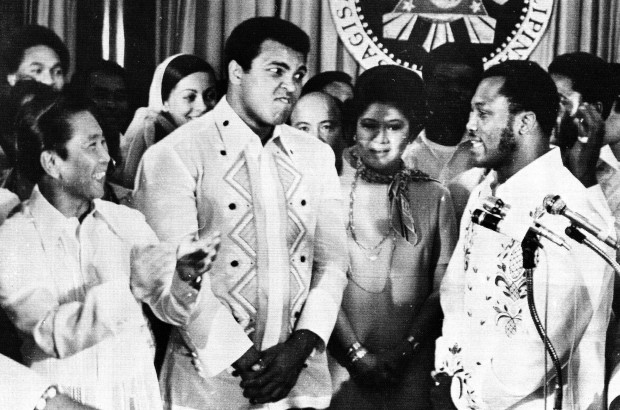
FILE – In this Sept. 18, 1975, file photo, Philippines President Ferdinand Marcos, left, applauds as challenger Joe Frazier, right, makes some remarks about world champion Muhammad Ali, second from left, during their call on Marcos at the Malacanang Palace in Manila, Philippines. Ali, the magnificent heavyweight champion whose fast fists and irrepressible personality transcended sports and captivated the world, has died according to a statement released by his family Friday, June 3, 2016. He was 74. (AP Photo/Jess Tan, File)
MANILA, Philippines — From boxers to left-wing activists, Filipinos in this boxing-crazy nation on Saturday grieved the death of Muhammad Ali, which brought back fond memories of the epic 1975 “Thrilla in Manila” fight between Ali and Joe Frazier.
Sports commentator Ronnie Nathanielsz, who was assigned by then-dictator Ferdinand Marcos to act as government liaison to Ali for the bout, said, “We lost a hero, a peacemaker and a truly charismatic human being.”
The Oct. 1, 1975, heavyweight championship, one of the greatest boxing matches in history, was won by Ali on a technical knockout at the jam-packed Araneta Coliseum in suburban Quezon city and was watched by a worldwide audience.
After the bout, the ecstatic owner of the arena told Ali that he would build a shopping mall and name it after him. The popular Ali Mall stands to this day.
The bout got its name from Ali’s widely publicized boast that the 15-rounder would be a “killa and a thrilla and a chilla, when I get that gorilla in Manila.”
“It put the Philippines on the map,” Nathanielsz told The Associated Press.
Marcos reportedly wanted to hold the bout in the Manila metropolis to deflect international and domestic attention from the political restiveness and growing Muslim and communist insurgencies after placing the entire Philippines under martial rule three years earlier.
Accompanying Ali from Hawaii on board a Philippine Airlines plane, Nathanielsz said the American boxer was welcomed by tens of thousands of Filipino fans “like the pope” from the airport to the Manila Hilton. Ali decided right away to conduct a workout at a nearby cultural center complex by Manila Bay so Filipinos can see more of him, Nathanielsz said.
Marcos’s image did not bother Ali, who personally liked the Philippine leader and embraced him when they met in Manila, Nathanielsz said, adding that the president was also a boxer in his younger years.
During his meeting with Ali, Nathanielsz quoted Marcos as saying, “I want the world to see that we have peace and order, people are happy, the economy is doing well and the country is moving forward.”
In an awkward moment during his Manila visit, Ali introduced his girlfriend to Marcos as his wife. The dictator, who was with his wife, Imelda, told Ali that he had a beautiful wife. “Ali, looking at Imelda, said, ‘Mr. President, you haven’t done too badly yourself,'” Nathanielsz said.
The scene, which was covered by the press, was shown in the U.S. and caught on TV by Ali’s wife, who hurriedly flew to the Philippines to confront the boxer, according to Nathanielsz.
Nathanielsz likened Ali to Filipino boxing star Manny Pacquiao, saying both were icons who were close to and inspired common folk.
Roel Velasco, who won a bronze medal at the 1992 Olympics in Barcelona, Spain, thanked Ali for helping inspire him to become a boxer, saying, “It’s sad to see one of the world’s greatest boxers go.”
Velasco, who now coaches Filipino boxers, including a handful who are flying to the Olympics in Brazil later this year, recalled how the Ali-Frazier Manila bout riveted his central Philippine province. Ali instantly “became one of my idols,” said the 46-year-old Velasco.
Left-wing activists also mourned Ali’s death, praising him for his refusal to join the U.S. war in Vietnam.
“What made him great was not just his achievements in sports, but also his staunch defense of his principles,” said Renato Reyes, of the left-wing Bayan Muna group. “He refused to fight other oppressed people and called to task the U.S. government for failing to stop oppression and racism at home.”
“This was truly a heroic and courageous act at the time,” Reyes said.

